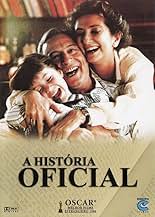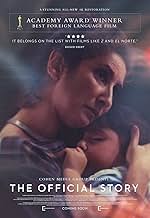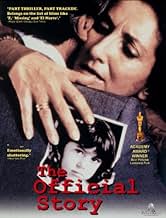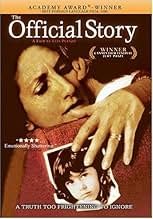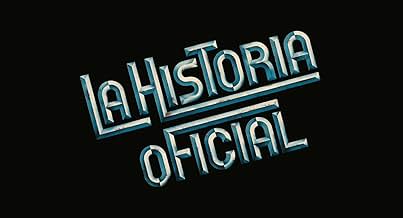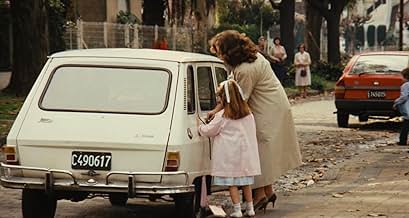IMDb RATING
7.7/10
11K
YOUR RATING
During the final months of Argentinian Military Dictatorship in 1983, a high school teacher sets out to find out who the mother of her adopted daughter is.During the final months of Argentinian Military Dictatorship in 1983, a high school teacher sets out to find out who the mother of her adopted daughter is.During the final months of Argentinian Military Dictatorship in 1983, a high school teacher sets out to find out who the mother of her adopted daughter is.
- Won 1 Oscar
- 25 wins & 9 nominations total
- Director
- Writers
- All cast & crew
- Production, box office & more at IMDbPro
Storyline
Did you know
- TriviaThe filming began in 1983, the same year that the military dictatorship ended in Argentina. The filming was cancelled due to the threats received by the director, actors and particularly to Analia Castro's family. It was announced that filming was cancelled, but production continued in secret until 1985.
- Alternate versionsThe 2015 restoration is extended by 2 minutes due to the inclusion of restoration credits at the beginning and end of the film. The opening restoration credits play over the opening scenes in Alicia's classroom. During the restoration end credits, the background goes black and the instrumental version of 'El país de nomeacuerdo' is looped.
Featured review
A searing political exposé situated in the immediate aftermath of Argentina's Dirty War (1976- 1983), director Luis Puenzo's second feature THE OFFICIAL STORY became the first Argentinian movie to snatch Oscar's BEST FOREIGN LANGUAGE PICTURE laurels.
In 1983, the seemingly perfect life of a middle-class high-school history teacher Alicia Ibáñez (Aleandro) starts to crack when she begins to suspect the birth parents of her adopted daughter Gaby (Castro, an elfin darling), now 5-year-old, might be victims of political persecutions during the military dictatorship. She is determined to find out the truth and inexorably clashes with her husband Roberto (Alterio), who is a well-off government representative and might be in the knowing from the very start.
Puenzo and his co-screenwriter Aída Bortnik import a limpid script to set Alicia to embark on a late-but-better-than-never realization of her country's buried horror which implausibly has been eluded by her until that point, as one of her colleagues Benítez (Contreras) jests that nothing is more gratifying than a guilty bourgeois woman.
What makes Alicia tick is the return of her best friend Ana (Villafañe) from abroad, during an escalatingly poignant two-hander from the two magnificent actresses, Ana confesses to her that she was subjected to torture by the secret police (she is an associate of a subversive) and was forced into exile. Ana's account jolts Alicia into facing up with that troubling question, at the same time, a subplot pertains to the rebellious polemic of Alicia's students (atrociously played by actors much maturer than high schoolers) also vouch for the progress on her conscience. When she finally meets Sara (Ruíz), possibly Gaby's biological grandmother, she bestirs herself with a final attempt to reason with her intransigent husband.
Apart from the film's polemical angle in cashing in on a topical powder keg, in retrospect, the film's more lingering sway is underlain by its less argumentative depiction of women's place in a typical patriarchal society, through our heroine, Alicia is an ordinary woman in every aspect, mostly hedged in her domestic remit, a mother and a wife, Roberto has never cared to ask anything about her job, as if it is just a hobbyhorse to keep her busy. During Roberto's apoplectic wrangle with his leftist father Jose (Battaglia) and brother Enrique (Arana), Alicia's total silence speaks volumes in that tableau vivant - women have no voice in politics (neither in religion, as glanced through Alicia's vain endeavor inside a confessional, belittled by a snotty man of God), they are subservient, ancillary and biddable, but, as a human being, every sane soul is endowed with the judgment of right and wrong, and Puenzo's sensible work pays the highest homage to that, which makes the ending incredibly uplifting albeit with such a small gesture, as it would happen in real life.
Puenzo assembles an ace cast, Villafañe, Battaglia, Ruíz are all bankable scene-stealers, but no one can upstage Norma Aleandro's pyrotechnics, which oozes heartfelt nuance to countervail a melodramatic milieu Alicia is entangled with and staunchly refuses any trace of ham. On the other hand, Héctor Alterio embodies Roberto, a mouthpiece of the junta, with repulsion-inducing exertion as the sole villain in the film, an outstanding feat to accomplish out of a less well-rounded character.
All in all, Puenzo's blunt cri-de-coeur is graced with a lyrical accompanying score and an encroaching camera-work as if it tries to delve as deep as possible into its characters' psyche, an engaging infotainment with humanity unflaggingly glistening in its nucleus.
In 1983, the seemingly perfect life of a middle-class high-school history teacher Alicia Ibáñez (Aleandro) starts to crack when she begins to suspect the birth parents of her adopted daughter Gaby (Castro, an elfin darling), now 5-year-old, might be victims of political persecutions during the military dictatorship. She is determined to find out the truth and inexorably clashes with her husband Roberto (Alterio), who is a well-off government representative and might be in the knowing from the very start.
Puenzo and his co-screenwriter Aída Bortnik import a limpid script to set Alicia to embark on a late-but-better-than-never realization of her country's buried horror which implausibly has been eluded by her until that point, as one of her colleagues Benítez (Contreras) jests that nothing is more gratifying than a guilty bourgeois woman.
What makes Alicia tick is the return of her best friend Ana (Villafañe) from abroad, during an escalatingly poignant two-hander from the two magnificent actresses, Ana confesses to her that she was subjected to torture by the secret police (she is an associate of a subversive) and was forced into exile. Ana's account jolts Alicia into facing up with that troubling question, at the same time, a subplot pertains to the rebellious polemic of Alicia's students (atrociously played by actors much maturer than high schoolers) also vouch for the progress on her conscience. When she finally meets Sara (Ruíz), possibly Gaby's biological grandmother, she bestirs herself with a final attempt to reason with her intransigent husband.
Apart from the film's polemical angle in cashing in on a topical powder keg, in retrospect, the film's more lingering sway is underlain by its less argumentative depiction of women's place in a typical patriarchal society, through our heroine, Alicia is an ordinary woman in every aspect, mostly hedged in her domestic remit, a mother and a wife, Roberto has never cared to ask anything about her job, as if it is just a hobbyhorse to keep her busy. During Roberto's apoplectic wrangle with his leftist father Jose (Battaglia) and brother Enrique (Arana), Alicia's total silence speaks volumes in that tableau vivant - women have no voice in politics (neither in religion, as glanced through Alicia's vain endeavor inside a confessional, belittled by a snotty man of God), they are subservient, ancillary and biddable, but, as a human being, every sane soul is endowed with the judgment of right and wrong, and Puenzo's sensible work pays the highest homage to that, which makes the ending incredibly uplifting albeit with such a small gesture, as it would happen in real life.
Puenzo assembles an ace cast, Villafañe, Battaglia, Ruíz are all bankable scene-stealers, but no one can upstage Norma Aleandro's pyrotechnics, which oozes heartfelt nuance to countervail a melodramatic milieu Alicia is entangled with and staunchly refuses any trace of ham. On the other hand, Héctor Alterio embodies Roberto, a mouthpiece of the junta, with repulsion-inducing exertion as the sole villain in the film, an outstanding feat to accomplish out of a less well-rounded character.
All in all, Puenzo's blunt cri-de-coeur is graced with a lyrical accompanying score and an encroaching camera-work as if it tries to delve as deep as possible into its characters' psyche, an engaging infotainment with humanity unflaggingly glistening in its nucleus.
- lasttimeisaw
- May 7, 2017
- Permalink
- How long is The Official Story?Powered by Alexa
Details
Box office
- Gross US & Canada
- $29,426
- Opening weekend US & Canada
- $29,426
- Nov 10, 1985
- Gross worldwide
- $69,832
Contribute to this page
Suggest an edit or add missing content



